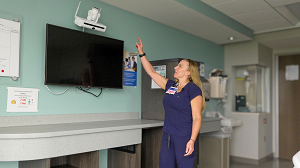New virtual nurses provide extra layer of support for patients and bedside teams

Henry Ford Health is introducing a hybrid nursing care model designed to enhance patient safety, support bedside nurses and address the nationwide shortage of health care workers.
The new virtual acute care nursing program officially launched this summer at Henry Ford Jackson Hospital following a successful year-long pilot program. The program provides an extra layer of support for patients on the hospital's acute care floors by adding a virtual nurse to their care team.
Using smart camera technology built into patient room TVs, virtual nurses connect with patients through secure video chats, similar to Zoom or FaceTime. From a 24/7 command center in the hospital, they perform tasks that don't require a physical presence, such as safety rounds, admission and discharge tasks, chart reviews and patient education.
"Our virtual nurses are another set of eyes and ears to answer patient questions, assist with admissions and discharges, review charts and perform regular safety checks," said John Roberts, director of Virtual Patient Care Services at Henry Ford Health. "By handling these tasks, they give bedside nurses more time to focus on direct bedside care, which improves the overall patient experience."
Henry Ford Health plans to expand virtual nursing to all 13 of its acute care hospitals. Henry Ford West Bloomfield Hospital is set to launch its virtual nursing program in 2026, with other sites to follow.
This initiative comes amid a longstanding nationwide nursing shortage. In Michigan, the deficit of registered nurses is expected to reach 19% by 2037, one of the highest in the country.

"This is a major step in reimagining how we deliver care in the face of workforce challenges and the growing medical needs of our aging population," said Eric Wallis, senior vice president and chief nursing officer at Henry Ford Health. "Virtual nurses help ease the workload of our bedside teams, improve job satisfaction and create new career paths for experienced nurses seeking less physically demanding roles."
Henry Ford Jackson Hospital's program will serve as a model for other hospitals across the health system. Hospital leaders tested the program over the course of a year, starting first with 22 beds and later doubling to 44. This August, the program expanded across more than 200 beds in the hospital's acute care units, where patients receive short-term treatment or recover from surgery.
In the program's first full month of operations in August 2025, virtual nurses conducted more than 600 hours of calls with patients and completed over 24,700 tasks, engaging with about 1,350 patients across the hospital’s acute care units.
"It's become an invaluable tool to support both patients and team members where they need it most," said Emily Banner, a registered nurse who works in a hybrid role as both a virtual and bedside nurse at Henry Ford Jackson Hospital. "As a virtual nurse, we can take extra time with patients — listening, answering questions, making them feel truly heard. That frees up more time for the care team on the floor to focus on hands-on care without being pulled in every direction."
To support virtual nursing, patient rooms on the hospital's acute care floor are now equipped with smart camera technology from Stryker's care.ai platform. This technology integrates with the SONIFI Health interactive TVs already set up in patient rooms.
Before a virtual nurse visit begins, patients receive a prompt on their TV screen inviting them to start the video chat. A green light indicates when the camera is active, and when not in use, it automatically tilts toward the ceiling to protect privacy.
For high-risk patients, virtual nurses provide an added layer of oversight to help ensure safety. In cases where there is a risk for falls, for example, virtual nurses conduct regular safety checks to confirm the patient remains in bed and preventive measures, such as bed alarms, are properly activated.
To further help with safety, the Care.ai platform also includes AI-powered features for fall-risk detection and ambient keyword recognition, which are expected to roll out at Henry Ford Jackson Hospital in the fall.
###
MEDIA INQUIRIES: mediarelations@hfhs.org
.svg?iar=0&hash=F6049510E33E4E6D8196C26CCC0A64A4)

/hfh-logo-main--white.svg?iar=0&hash=ED491CBFADFB7670FAE94559C98D7798)









